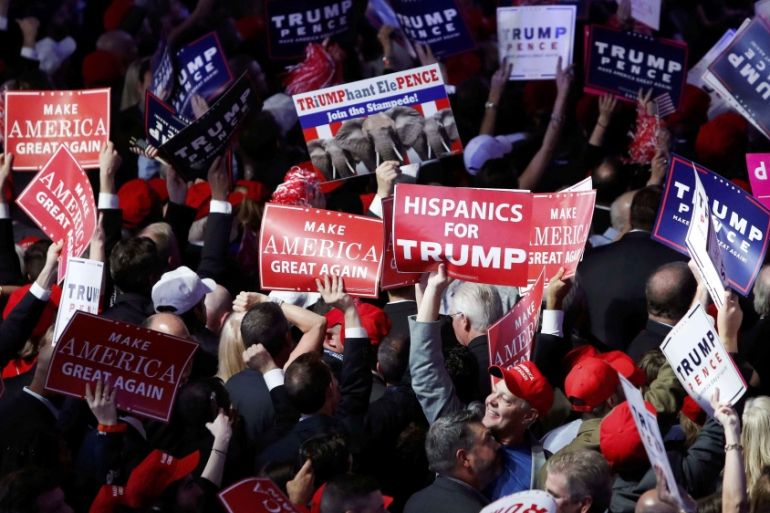A dismal day for human rights in the US
While Trump’s presidency might be more isolationist on foreign policy, it will be disastrous for human rights at home.

Despite tightening polls in the days leading up to the US presidential election, many believed that Hillary Clinton would eke out a victory, in part because she had been consistently ahead in predictions, and in part because the alternative was an unthinkable descent into fascism and hatred.
In the end, voters embraced Donald Trump’s intolerance and vitriol, in a campaign that edged political discourse into a mockery of truth, civility and substance. His presidency will be a catastrophe for human rights and the rule of law.
Keep reading
list of 4 itemsThe Take: What would a third Modi term mean for India?
Full jury panel seated on third day of Trump’s New York hush-money trial
Jacob Zuma’s nine lives: How South Africa’s ex-president keeps coming back
Trump denigrated African Americans as monolithic denizens of inner city bedlam, demonised immigrants and Muslims, mocked a man with disabilities and degraded women.
He turned unbounded greed into a virtue, elevated for-profit business to a governance model, and threatened to sue his critics.
His bellicose language translated into behaviour in a climate of increased bullying in schools against populations he targeted and a surge in hate crimes against Muslims.
A black church in Mississippi was burned , with “Vote Trump” inscribed on the wall, and Trump fans called for Clinton’s incarceration and even execution.
‘Make America hate again’
The first presidential election held since a 2013 Supreme Court decision gutted the Voting Rights Act occurred amid alarming efforts to suppress votes among those most likely to cast democratic ballots.
Yet Trump continued to stoke fears of a rigged election, and issued dog-whistle calls to monitor polls in urban areas , raising the prospect of voter intimidation. His unfounded claims of voter fraud were intended as a bulwark against the humiliation of defeat.
Yet, there are real threats to democracy that went unaddressed, including the influx of money into politics that uphold the interests of the 1 percent and a craven media that failed miserably to hold him to any standard of veracity.
He will now govern a bitterly divided country that has completely lost sight of its founding ideals, exacerbate its existing troubles, and imperil its very democracy.
Trump positioned himself as an authentic, anti-establishment candidate who can “Make America great again”, but as critics grimly joked, the more honest slogan was to “Make America hate again”.
His victory has caused panic for many vulnerable groups: Muslims, African Americans, LGBTI people, women, immigrants and others in the US petrified of the fallout from the nationalism, xenophobia, misogyny and racism that he has unleashed.
He will now govern a bitterly divided country that has completely lost sight of its founding ideals, exacerbate its existing troubles and imperil its very democracy.
Economic and social inequality will continue to subvert the American dream and racial tensions will grow worse. Trump was never the outsider who could fix the nation. It was former democratic presidential candidate Bernie Sanders who represented the opportunity to uproot the status quo by confronting crony capitalism and the institutions that entrench it.
For some with a more global view, Trump’s victory presents some solace. Clinton is generally viewed as more of a hawk than Trump. She supported the Iraq war, which provoked a humanitarian catastrophe and is partially responsible for the rise of the Islamic State of Iraq and the Levant (ISIL), promoted regime change in Libya to disastrous effect, and has called for a no-fly zone in Syria, which could lead to more serious confrontation with Russia.
OPINION: Donald Trump – The Islamophobia president
Her Latin American policies have been dismal. Some leftists feared a Clinton presidency would continue to project its military might and economic priorities across the globe, engage in endless war, and undermine, not advance, human rights in places like Honduras and Haiti.
As they are right to note, the human rights of those living outside the US also matter. Hawkish international policies have domestic implications as well: costly military entanglements deplete coffers that could be used instead to fill the gaping shortages in funding for job creation, education, healthcare, infrastructure and reducing reliance on fossil fuels.
What will become of America?
But though he espouses a more isolationist foreign policy, Trump’s vindictiveness, impulsivity and incoherence make it hard to fathom how people feel safe entrusting him with the nuclear codes or with stewardship of a planet imperilled by the climate change he denies.
OPINION: The US is not a post-racial society
Under Trump, the US will probably continue to fall short of international human rights ideals. He has evinced his hostility to even the small number of Syrian refugees admitted to the US, suggesting that the desperate families fleeing the same extremist terrorism from which he wants to keep American safe pose a danger to us instead, and has threatened to Muslims from entering the country.

Trump seems likely to continue the use of drones for extrajudicial assassination despite civilian casualties: in fact, he once said the families of terrorists should be targeted as well.
He has called for the waterboarding of terrorists, despite its lack of efficacy and illegality, and said that Guantanamo Bay prison will be expanded under his watch, where even US citizens could be tried and held.
Many Americans will start their new day in a state of shock and despair, fearing what will become of their country.
The US does not always live up to its vaunted ideals, but a Trump presidency will trample them altogether. Those who believe in a more just and equitable world will have their work cut out for them.
Lauren Carasik is a clinical professor of law and the Director of the International Human Rights Clinic at Western New England University School of Law.
The views expressed in this article are the author’s own and do not necessarily reflect Al Jazeera’s editorial policy.
